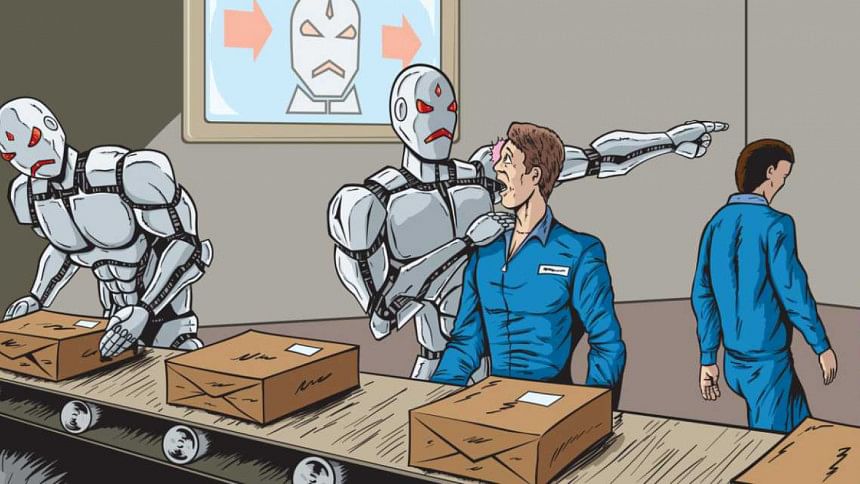The robot takeover is greatly exaggerated

There's lots of fretting these days that automation will displace huge numbers of workers. It makes sense to be worried. Although adoption of machines in the past didn't make human labour obsolete, there's no guarantee that future technology will work the same. Maybe this is an issue in the long-term, but for now, at least, automation probably isn't taking away many jobs.
To hear me confidently declare that may come as a surprise to some, given the steady flow of articles sounding the alarm about a new paper by Massachusetts Institute of Technology economists Daron Acemoglu and Pascual Restrepo. Entitled "Robots and Jobs: Evidence from US Labour Markets," the paper finds evidence that robots are already costing American jobs. Given that automation-induced job loss is often casually called the "rise of the machines," it's no surprise that Acemoglu and Restrepo's study seems to confirm people's worst fears.
But a closer look at the paper shows that it actually gives reason not to be too concerned about the near-term impact of automation. Despite the attention-grabbing headline about robots, the paper is really more about other factors — and its message is far from apocalyptic.
That closer look was taken by Lawrence Mishel and Josh Bivens of the Economic Policy Institute, a think tank. In a long essay, they examine the Acemoglu and Restrepo paper in detail. They note that the two economists find that capital investment, and use of computers specifically, tend to increase jobs.
As Acemoglu and Restrepo themselves wrote: "(Our results) suggest that other types of capital equipment and even computers tend to increase the demand for labour." This result underscores the possibility — though certainly does not prove — that industrial robots might have a very different impact on employment and wages than other types of recent technologies.
"Robots," you see, are actually a very narrowly defined type of automation. Most automated-production technologies, from self-checkout kiosks to machine-learning algorithms to automated phone-answering machines, might be called "robots" in common parlance, but the definition of robot used by Acemoglu and Restrepo is limited to fully autonomous multipurpose machines with no human operators. If these machines are one of only a few kinds of automation that are causing job losses, and other forms of automation are complementing human beings and creating new jobs, the labour market is probably in good shape.
Mishel and Bivens also give some other reasons to be sceptical of Acemoglu and Restrepo's findings. They note that workers haven't been changing occupations as much as they did in past decades — if people were losing their jobs to automation at a faster rate, we'd expect them to have to retrain more frequently.
Mishel and Bivens note that productivity growth and corporate investment in information technology has fallen, which also doesn't fit with a story of accelerating automation. And they show that according to Acemoglu and Restrepo's own estimation, the negative impact of Chinese competition on US jobs was more than three times larger than the effect of robots.
This is quite a convincing rebuttal. It seems clear that the economics press has overplayed the Acemoglu and Restrepo paper. In part, this is probably because of a general anxiety about new technology and automation, which happens in the wake of any big technological revolution. And the fact that the paper had the word "robots" in the title, which just happens to be a trendy buzzword, likely didn't help.
As I said, this doesn't mean automation will never be a concern. But as of today, technology remains good for human employment. Which means automation is far, far down on the list of problems to be confronted.
People in the technology industry, especially, should shift their focus away from the automation issue. Entranced by the spectacular progress in their own very narrow fields, and being the types to take science fiction seriously, some tech leaders are touting universal basic income as the only way to save humans from obsolescence and impoverishment.
Instead, they should be focusing more on real, pressing problems. Inequality in developed countries remains severe and potentially harmful to civic society. The productivity slowdown is disturbing and imposes a drag on growth. Reduced economic dynamism, including falling start-up rates and less job switching, is a concern. Monopoly power is a looming threat to the health of the economy. And although wages have been rising recently, those gains come after many years of stagnation or decline.
The US and other developed countries need to work on these issues before they start panicking over science fiction scenarios that have so far shown no signs of materialising.
The writer is a Bloomberg View columnist.
Copyright: Asia News Network/The Korea Herald
Follow The Daily Star Opinion on Facebook for the latest opinions, commentaries and analyses by experts and professionals.

 For all latest news, follow The Daily Star's Google News channel.
For all latest news, follow The Daily Star's Google News channel. 








Comments